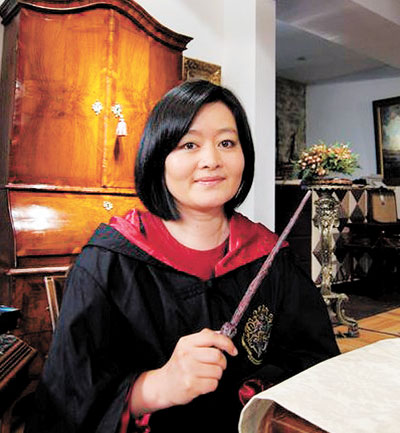|
THE past few weeks have been a busy period in the world of China’s publishing industry.
A few days ago the Chinese edition of Fernando Pessoa’s “A Little Larger Than the Entire Universe” was accused of plagiarism, while Aug. 6, well-known English-Chinese translator Ma Ainong sued China Women Publishing House and New World Publishing House for copyright infringement.
The problem of rogue translations has become so huge that Ouyang Tao, director of the foreign literature editing for People’s Literature Publishing House, took to the Internet inviting netizens to “find out counterfeit translators” together.
The war against shady translators and translations is becoming increasingly intense. Many major publishing houses and well-known translators argue for more supervision on the translation industry, to regulate the market and protect their intellectual property rights.
They said that problems, such as plagiarism and poor-quality translation, have already harmed the publishing industry, Chinese-language newspaper reported.
Ma Ainong or Ma ‘Ainong’
Ma is a well-known translator born in Jiangsu Province. She and her sister, Ma Aixin, became famous among industry insiders for their outstanding translations of J.K. Rowling’s “Harry Potter” books.
However, Ma found that several well-known online bookstores were selling overseas children’s books translated by a person called Ma “Ainong” (a different Chinese character with the same pronunciation). Many of her friends wondered how she could manage to translate so many novels in such a short period of time, but she hadn’t.
The series of children’s books, published by the New World Publishing House in October 2012, consists of 16 books with more than 40 stories. Among the stories are well-known fairy tales such as “The Wizard of Oz,” “The Little Prince” and “Peter Pan.” The original versions of the stories are in English, French, Russian, German, and Arabic. The books all have “translated by Ma ‘Ainong’” on the cover.
“I have a great passion for literary translation. For decades I’ve worked very hard translating many overseas works and built a reputation for excellence in translating children’s literature. In the hope of making money and attracting readers the New World Publishing House published the books using a translator’s name which sounds exactly the same as mine. This has infringed my rights and harmed my reputation, and misled readers,” Ma said.

Ma also found a Chinese edition of Lucy Maud Montgomery’s “Anne of Green Gables,” published by China Women Publishing House, that had a very similar translation style to hers. “The way it translates and the way it uses words are very similar to mine. The titles of each chapter are exactly the same as the titles in my edition. Different translators make very different translations of poems due to their different interpretations and styles, but many of the poems in this edition use the same words as my edition,” she said.
Poor quality
Over recent years, there has been an increasing number of poor-quality translations on the market. There are “translation masters” who can “translate 10 different languages” and translators who “don’t have basic translation and literary writing skills,” said Ouyang.
“There are some business people hiring writers to change a few words and sentences or adjust the structures of other people’s translated works. In this way, they can publish new ‘translated editions’ of classic literature and sell the books at very low prices. Many readers who don’t know about the industry are fooled by these tricks,” Ouyang said. “Although the original translators are very angry about this, they have given up protecting their copyrights. It is very difficult to get evidence, it takes too long and it’s too expensive to sue.”
To protect translators’ and readers’ rights, the People’s Literature Publishing House posted detailed information of its translation works on the Internet to guide readers.
“Poor-quality works mislead readers, in particular young readers, and create negative opinions on literary translations,” Ouyang said.
More supervision called for
Some publishing experts say that many publishing houses don’t have a foreign-language editor despite publishing translated works.
“A popular practice is to take translated copies from Hong Kong and Taiwan and make small changes before publishing them on the Chinese mainland. This behavior makes publishers and editors ignore their responsibilities for quality control,” an unidentified expert said.
In 2012, there were 16,115 copyrighted overseas books published. “Every year, there are more than 10,000 books which need to be translated. Among these translations, many are of very poor quality. Some books are translated by students or several translators. The publishing houses can make quick money and win a bigger market share, making good translations less financially attractive,” the expert said.
He suggested that related departments should take action soon to regulate the market and protect the rights of publishing houses and translators. “Those that violate rules should be punished and ordered to suspend selling their works,” the expert said.
(Wang Yuanyuan)The war against shady translators and translations is becoming increasingly intense. Many major publishing houses and well-known translators argue for more supervision on the translation industry to regulate the market.
|

